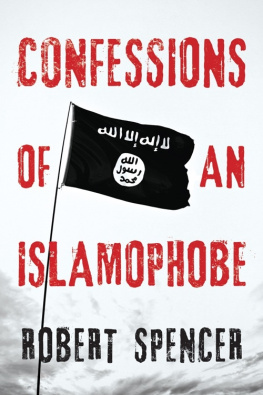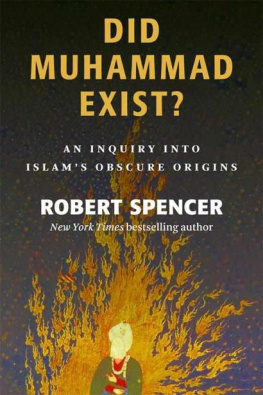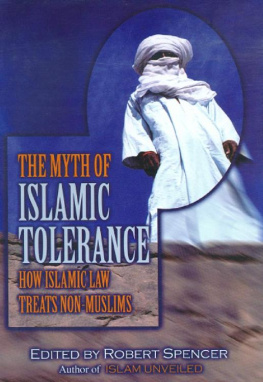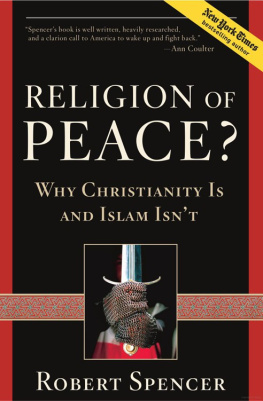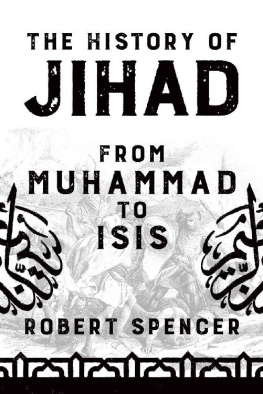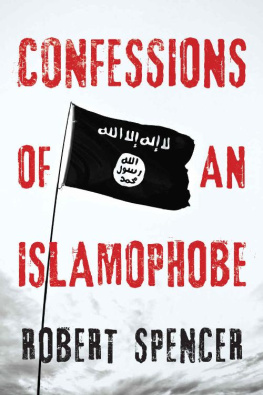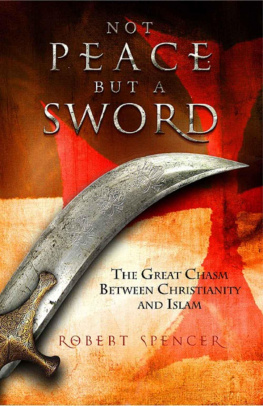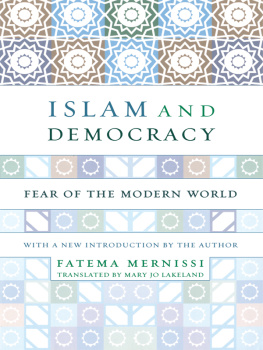CONFESSIONS
OF AN
ISLAMOPHOBE

ROBERT SPENCER

A BOMBARDIER BOOKS BOOK
An Imprint of Post Hill Press
Confessions of an Islamophobe
2017 by Robert Spencer
All Rights Reserved
ISBN: 978-1-68261-490-7
ISBN (eBook): 978-1-68261-491-4
Cover Design by Dan Pitts
No part of this book may be reproduced, stored in a retrieval system, or transmitted by any means without the written permission of the author and publisher.


Post Hill Press
New York Nashville
posthillpress.com
Published in the United States of America
This book is offered, with immense respect and gratitude,
to all those who dare to speak truly about
the nature and magnitude of the jihad threat,
despite the character assassination that inevitably ensues.
CONTENTS
ACKNOWLEDGEMENTS
The charge of Islamophobe, when attached to any honest analyst of the jihad terror threat, is a nasty smear that has destroyed reputations, besmirched noble initiatives and important research, and poisoned the public discourse. I am humbled and honored to work with and be associated with many of the foremost warriors for freedom who have been defamed in this way, including David Horowitz, Pamela Geller, Steve Emerson, and Frank Gaffney. If free societies prevail, the constant abuse to which they and others who have borne the label Islamophobe have suffered will be remembered as a manifestation of hysteria reminiscent of the Salem Witch Trials, and they will be hailed as the heroes they are.
This book could not have been written if I didnt have so much help to maintain our daily news and commentary site on jihad activity, Jihad Watch (www.jihadwatch.org) from colleagues Christine Douglass-Williams and Hugh Fitzgerald, as well as my mysterious, knowledgeable, and indefatigable tech expert Marc. If Jihad Watch is, as I hope it to be, a beacon of the truth in a field that is overrun by disinformation and misinformation, it is largely because of their efforts, and the support and help of Michael Finch of the David Horowitz Freedom Center.
Im honored that this book is one of the initial offerings of the new Bombardier Books, and hope to work with David S. Bernstein on many future bombing missions. This book was different from my others in numerous ways, and David guided me with particular acuity through all manner of minefields. If it werent for his sense of taste and proportion, his focus, and his vision for what this book could and should be, it simply wouldnt be worth reading. If it is, thank Bernstein, and Adam Bellow as well. One morning as I walked the beautiful streets of Charleston, South Carolina, Bellow and I had a long conversation about this; his advice and feedback was well worth heeding, and I did.
No Acknowledgments page would be complete without a nod to Jeffrey Rubin, who published my first articles way back in the 1980s, guided my first book to publication, gave me the idea and inspiration for my first bestseller, The Politically Incorrect Guide to Islam (and the Crusades) , and helped me in more ways than I can enumerate here. Heres to you, Jeff, as always. Like all my other books, this one, in significant measure, is for you.
PREFACE
My Journey to Islamophobia
When I was very young, frequently my mother and brother and I would walk up our block to the corner, and then down the next street, unpaved and with a tree squarely in the middle of the intersection and houses only on one side of the street, to a small bungalow at the end of a dirt road. There lived my grandparents, Stamatios (Thomas, or Tom to his close friends) and Maria (always Mary) Zompakos , hardy and affable people with a touch, for me, of exotica.
Their home was an exciting and intriguing world, so very different from my American house around the block. My grandparents house was filled with the sweet aroma of my grandfathers pipe smoke, and with Greek Orthodox icons of Jesus, Mary, and various saints. My mother and grandparents would converse in Greek, but when I asked them about Greece, I learned to my surprise that none of them had lived on the Greek mainland, or even ever actually been there. My grandparents were not from Greece but from the Ottoman Empire, from Tsesmes (now Cesme ) on the Aegean Sea, right across the Cesme Strait from the island of Chios.
Tsesmes , which is about fifty-five miles from Smyrna (Izmir), and all of Western Anatolia, was a majority Greek area from time immemorial. But as World War I drew to a close and the Ottoman Empire was collapsing, both Muslims who supported the Ottoman sultan and secularists who wanted to create a Turkish national state regarded the Greeks of Asia Minor not as fellow citizens of a minority religion, but as a problem to be solved.
Muslims who wanted Sharia rule regarded the Greeks, as well as the Armenians and other Christians in what would soon become Turkey, as kuffar harbi , infidels at war with Islam for preferring independence (and, in the Greeks case, union with Greece) over continuing fealty to Turkish rule. The Young Turks of Kemal Ataturk and his fellow secularists regarded Islam, albeit a depoliticized, cultural Islam, as central to the Turkish identity around which they were setting out to construct the new Turkish national state. For both groups, therefore, the non-Muslims had to go.
And they did go. They were forced to. In October 1915, Ismail Enver, the Ottoman minister of war, declared that he planned to solve the Greek problem during the war...in the same way he believe[d] he solved the Armenian
Not all the Greeks were killed. Some were exiled. My grandmother, Maria Chrissafakis , who always insisted in the United States on being known as Mary, and her family escaped from Tsesmes and made their way to Nantes, France, and sometime thereafter boarded the S.S. Chicago bound for the United States. And so it was that my grandmother, listed as seventeen but possibly a year or so younger, along with her parents and two brothers, arrived at Ellis Island on the Chicago from Bordeaux on April 10, 1918. I havent been able to locate any records of my grandfathers arrival in the United States, but the 1930 U.S. Census lists Stamatios Zompakos as hailing from Smyrna, Turkey and having arrived in the U.S. in 1916. It lists his wife Mary as also hailing from Smyrna, and arriving in the U.S. in 1918.
On my office wall I have a photograph of Stamatios father, my great-grandfather, Stylianos Zompakos , looking piercingly at the camera, elaborately mustachioed and wearing zouave pantaloons and boots. He is seated next to his wife, whose name has been lost to me; she is wearing a shawl and a long-suffering look. Two teenaged daughters stand behind them, dark-eyed, serious, staring solemnly off to the left. Between the couple is my great-uncle George, looking just as solemn and grave as his ten years on the planet would allow, clutching a toy rifle.
My grandfather is not in the picture, for reasons unknown to me. As the ages of the people in the picture indicate that it was taken around the time when he was eighteen or twenty and had left the country, he may have already gone when it was taken. I do know, however, that ultimately his three siblings followed him to the U.S., as the whole family had intended to do. But it was not an easy departure. As they loaded their possessions on a boat that was to take them to Crete and open their passageway to the New World, a Turkish soldier with a rifle slung over his soldier watched them. He did not make a move toward them, but just watched them and smoked cigarettes, expressionless, as they carried their belongings to the boat.
Next page
